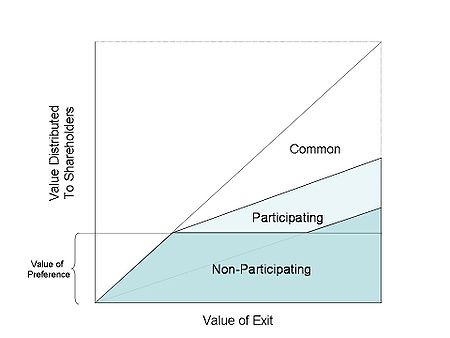
Participating Preferred Stock
Encyclopedia

Preferred stock
Preferred stock, also called preferred shares, preference shares, or simply preferreds, is a special equity security that has properties of both an equity and a debt instrument and is generally considered a hybrid instrument...
is preferred stock
Stock
The capital stock of a business entity represents the original capital paid into or invested in the business by its founders. It serves as a security for the creditors of a business since it cannot be withdrawn to the detriment of the creditors...
which provides a specific dividend
Dividend
Dividends are payments made by a corporation to its shareholder members. It is the portion of corporate profits paid out to stockholders. When a corporation earns a profit or surplus, that money can be put to two uses: it can either be re-invested in the business , or it can be distributed to...
that is paid before any dividends are paid to common stock
Common stock
Common stock is a form of corporate equity ownership, a type of security. It is called "common" to distinguish it from preferred stock. In the event of bankruptcy, common stock investors receive their funds after preferred stock holders, bondholders, creditors, etc...
holders, and which takes precedence over common stock
Common stock
Common stock is a form of corporate equity ownership, a type of security. It is called "common" to distinguish it from preferred stock. In the event of bankruptcy, common stock investors receive their funds after preferred stock holders, bondholders, creditors, etc...
in the event of a liquidation. This form of financing is used by private equity
Private equity
Private equity, in finance, is an asset class consisting of equity securities in operating companies that are not publicly traded on a stock exchange....
investors and venture capital
Venture capital
Venture capital is financial capital provided to early-stage, high-potential, high risk, growth startup companies. The venture capital fund makes money by owning equity in the companies it invests in, which usually have a novel technology or business model in high technology industries, such as...
firms. Holders of participating preferred stock get both their money back (with interest) and the money that is distributable with respect to the percentage of common shares into which their preferred stock can convert.
Like common stock
Common stock
Common stock is a form of corporate equity ownership, a type of security. It is called "common" to distinguish it from preferred stock. In the event of bankruptcy, common stock investors receive their funds after preferred stock holders, bondholders, creditors, etc...
, preferred stocks represent partial ownership in a company. Preferred stock shareholders may or may not enjoy any of the voting rights of those holding common stock
Common stock
Common stock is a form of corporate equity ownership, a type of security. It is called "common" to distinguish it from preferred stock. In the event of bankruptcy, common stock investors receive their funds after preferred stock holders, bondholders, creditors, etc...
. Also, unlike common stock
Common stock
Common stock is a form of corporate equity ownership, a type of security. It is called "common" to distinguish it from preferred stock. In the event of bankruptcy, common stock investors receive their funds after preferred stock holders, bondholders, creditors, etc...
, a preferred stock pays a fixed dividend that does not fluctuate. Often the dividend
Dividend
Dividends are payments made by a corporation to its shareholder members. It is the portion of corporate profits paid out to stockholders. When a corporation earns a profit or surplus, that money can be put to two uses: it can either be re-invested in the business , or it can be distributed to...
is cumulative. Thus, the company must pay all unpaid preferred dividends accumulated during previous periods before it can pay dividends to common shareholders. If the company is unable to pay this dividend
Dividend
Dividends are payments made by a corporation to its shareholder members. It is the portion of corporate profits paid out to stockholders. When a corporation earns a profit or surplus, that money can be put to two uses: it can either be re-invested in the business , or it can be distributed to...
, the preferred shareholders may have the right to force a liquidation of the company.
Participating preferred is often used as a "bridge" between a company that desires a higher valuation and a VC that believes in a lower valuation. A VC will agree to a higher valuation if it is accompanied by a participating preferred security—essentially challenging the company to earn the upside of the higher valuation.
The main benefit to owning preferred stock is that the investor has a greater claim on the company’s assets than common stockholders. Preferred shareholders always receive their dividends first and, in the event the company goes bankrupt, preferred shareholders are paid off before the holders of common stock
Common stock
Common stock is a form of corporate equity ownership, a type of security. It is called "common" to distinguish it from preferred stock. In the event of bankruptcy, common stock investors receive their funds after preferred stock holders, bondholders, creditors, etc...
. In general, there are four different types of preferred stock: cumulative preferred, non-cumulative, participating, and convertible.

